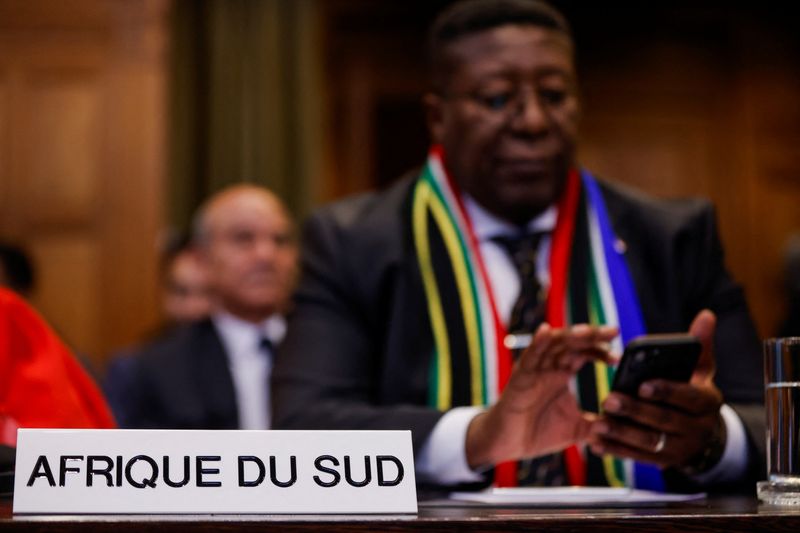By Stephanie van den Berg and Anthony Deutsch
THE HAGUE (Reuters) -Judges at the top United Nations court ordered Israel on Friday to immediately halt its military assault on the southern Gaza city of Rafah, in a landmark emergency ruling in South Africa's case accusing Israel of genocide.
WHAT IS THE ICJ?
The ICJ, also called the World Court, is the highest United Nations legal body, established in 1945 to deal with disputes between states. It should not be confused with the treaty-based International Criminal Court, also in The Hague, which handles war crimes cases against individuals.
The ICJ's 15-judge panel - which is expanded by an additional judge of Israel's choosing in this case because there is already a South African judge - deals with border disputes and increasingly cases brought by states accusing others of breaking U.N. treaty obligations.
South Africa and Israel are signatories to the 1948 Genocide Convention giving the ICJ jurisdiction to rule on disputes over the treaty. While the case revolves around the Israeli-occupied Palestinian territories, Palestinians have no official role in the proceedings.
All states that signed the Genocide Convention are obliged to not commit genocide, and to prevent and punish it. The treaty defines genocide as "acts committed with intent to destroy, in whole or in part, a national, ethnical, racial or religious group".
WHAT IS SOUTH AFRICA'S CASE?
The 84-page initial filing, brought by South Africa three months into the Gaza war, says that by killing Palestinians in Gaza, causing them serious mental and bodily harm and creating conditions of life "calculated to bring about their physical destruction", Israel is committing genocide against them.
In hearings in January, South Africa focused on Israel's failure to provide essential food, water, medicine, fuel, shelter and other humanitarian assistance to Gaza during its war with Palestinian militant group Hamas.
It also referred to Israel's sustained bombing campaign which Gaza health authorities say has killed over 35,000 people.
On May 16, South Africa made a fresh appeal to the court, asking it to order Israeli forces to halt military operations in Rafah, in southern Gaza, where roughly half the territory's 2.3 million people had sought refuge from the offensive further north. It also requested the court to order Israel to completely withdraw from the entire Gaza Strip.
WHAT IS ISRAEL'S RESPONSE?
Israeli Prime Minister Benjamin Netanyahu has dismissed the genocide accusations as outrageous. Israel says it does what it can to protect Palestinian civilians in Gaza and accuses Hamas of using Palestinians as human shields, an accusation Hamas denies.
Israel says it must have the right to defend itself after the Oct. 7 Hamas-led attack on Israel in which around 1,200 people were killed and more than 250 abducted, according to Israeli tallies.
In counter-arguments on May 17, Israel said South Africa's application "makes a mockery of the Genocide Convention" and asked the court to throw out the request.
WHAT HAS THE ICJ RULED IN THE CASE SO FAR?
After a first round of hearings on emergency measures in January, the court found it was plausible that Israel violated some rights guaranteed to Palestinians in Gaza under the Genocide Convention.
Judges ordered Israel to refrain from acts that could fall under the Genocide Convention and ensure its troops commit no genocidal acts against Palestinians.
Under the Genocide Convention, acts of genocide include killing members of a group, causing them serious bodily or mental harm, and deliberately inflicting conditions of life calculated to bring about the destruction of the group in whole or in part.
Judges also ordered Israel to take action to improve the humanitarian situation in Gaza.
In March, the court issued further emergency measures and ordered Israel to take all the necessary and effective action to ensure basic food supplies for Palestinians in Gaza.
On May 24, the ICJ ruled that the situation in Gaza had deteriorated since the court last ordered Israel to take steps to improve it, and therefore conditions had been met for a new emergency order.
"The state of Israel shall ... immediately halt its military offensive, and any other action in the Rafah governorate, which may inflict on the Palestinian group in Gaza conditions of life that could bring about its physical destruction in whole or in part," court president Nawaf Salam said.
The ICJ also ordered Israel to open the Rafah crossing between Egypt and Gaza to allow in humanitarian aid. Israel must provide access to the besieged enclave for investigators, it added, and report back on its progress within one month.

It did not rule on the broader genocide case itself. That decision could take years.
ICJ rulings are final and without appeal, but the court has no way of enforcing them. Still, rulings against Israel could damage its international reputation and set a legal precedent.